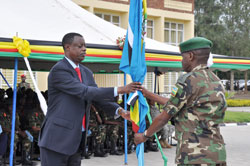The field exercise featuring armies from the East African Community (EAC) partner states concluded at the Rwanda Military Academy yesterday.The Command Post Exercise (CPX) code-named Ushirikiano Imara, saw the officers conduct indoor training on peace interventions, and dealing with various security threats.


The field exercise featuring armies from the East African Community (EAC) partner states concluded at the Rwanda Military Academy yesterday.
The Command Post Exercise (CPX) code-named Ushirikiano Imara, saw the officers conduct indoor training on peace interventions, and dealing with various security threats.
The military drills, which established the combined Joint Task Force Structure, helped the armies to jointly develop their capacity to respond to "complex security challenges.”
Closing the exercise, Defence Minister James Kabarebe said that with support from military and political leadership of the EAC states, the defence forces should adequately prepare for security challenges.
"Make an earnest After Action Review of how CPX was conducted with an aim of making improvements, ensure that you implement the lessons learnt and let it be an added value toward enhanced cooperation amongst the EAC armed forces,” Kabarebe advised.
The exercise brought together more than 300 officers, representing all the five EAC partner states of Kenya, Uganda, Tanzania, Rwanda and Burundi.
Kabarebe, along with delegations from the EAC partner states, toured the combined Joint Task Force Structure, and the general combined command post.
"The guests who have come from all over East Africa and beyond to witness the outcome of the exercise, is a testament of the support to EAC’s endeavours to seek our own means to address the security challenges in our region, with our armed forces taking the lead,’’ Kabarebe said.
The CPX, which was directed by Rwanda’s Brig. Gen Jacques Musemakweri and deputised by Tanzania’s Brig. Gen James Mwakibolwa, focused on military capacities in the areas of peace support, counter-terrorism, counter-piracy and disaster management.
"The exercise intended to practise military, police and civilian components from the five EAC, partner states to plan and develop necessary strategies to resolve an interstate conflict and carry out missions and tasks related to establishing normalcy in an imaginary state,’’ Gen. Musemakweri said.
Speaking at the function, the Deputy Secretary General of the EAC, in charge of productive and social sector, Jean Claude Nsengiyunva, said that the joint military exercises, are premised on the fact that peace and security are the foundation for social and economic development.
The exercises came at a time when Eastern Africa is faced with the threat of the Al Shabaab militia in lawless Somalia. Also posing a threat to regional security are the Democratic Forces for the Liberation of Rwanda (FDLR) militia and the Lord’s Resistance Army (LRA).
"Our challenge is to solidify and strengthen the EAC model for regional peace and security, as anticipated in the broader continental context of the eventual realisation of proposed African economic and political union,’’ Nsengiyunva said.
The EAC has, since 2005,held a series of joint military exercise on peace support, counter-terrorism, counter- piracy and disaster management.
The CPX Ushirikiano Imara exercise will be followed by a "Field Training Exercise” (FT-X) in 2012, which will also be hosted by Rwanda.
Ends


